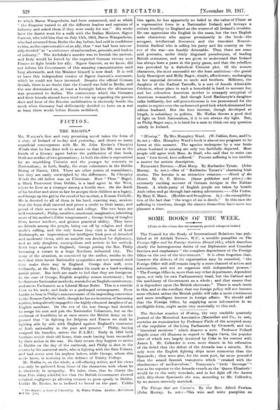FICTION.
THE BAGOTS.•
Me. WALLAS'S first and very promising novel takes the form of a story of Ireland of to-day and ymterday, and shows so many superficial convergences with Mr. St. John Ervine's Changing Winds that ho has done well to assure us that his MS. was in the hands of a literary agent before the publication of that book. Both aro studies of two generations ; in both the elder is represented by an unyielding Unionist and. the younger by converts to Nationalism; in both, finally, tho story culminates in the Dublin Rising of Easter, 1916. There are other 'Mints of resemblance, but they are easily outweighed by the differences. In Changing Windt the old father was an Ulsterman. Here " Phue " Begot-, a Black Protestant from Dublin-, is a land agent in the West, where he lives as a stranger among a hostile race. On the death of his brother and sister-in-law he accepts their children as a legacy, and brings up the girl its the creed of her mother, a Roman Catholic. He is devoted to all of thorn in his hard, exacting way, anxious that the boys shall succeed and prove a credit to their name, and proud of their success at school and college. The two boys are well contrasted ; Philip, sensitive, emotional, imaginative, inheriting more of his mother's Celtic temperament ; George being of tougher fibre, keener intellect, and greater practical ability. They have no friends among the people, being cut off by religion and their uncle's calling, and the only house they visit is that of Lord Ratlimoyle, an impecunious but intelligent Irish poor of detached and moderate views, with an amiable son destined for diplomacy, and an only daughter, cosmopolitan and artistic in her outlook. lied, boys migrate to England; George joining the Bar, Philip Incoming a curate in a large Northern industrial city. Thu irony of the situation, as conceived by the author, resides in the fact that their latent Nationalist sympathies are not aroused until they make their way in England. George does well, oven brilliantly, at the Bar ; Philip makes his mark as a haul-working parish priest. But both are made to feel that they are foreigners. In the case of George, English stupidity rouses resentment ; btit lie distrust. Nationalist methods, stands for an English constituency, andonters Parliament as a Liberal Home Ruler. This is a terrible blow to his uncle, and leads to a prolonged estrangement. Even harder to bear is Philip's announcement of his impending conversion to the Roman Catholic faith, though he has no intention of becoming a priest, being alreadyengaged to the highly educated daughter of an English merchant. On the eve of the war George had decided to resign his seat and join the Nationalist Volunteers, but on the outbreak of hostilities he at once enters the British Army on the ground that " in fighting for Belgium and France we shall be fighting aide by side with England against England's treatment of Irish nationality in the past and present." Philip, having resigned his benefice, enters the R.A.M.C. Early in 1916 both brothers revisit their old home, their uncle having been reconciled by their action in the war. On their return they hempen to arrive in Dublin on the day of the outbreak, and Philip is shot in the streets by his maternal uncle, who is fighting with the Sinn Feiners, and had never seen his nephew before, while George, whom this uncle know, is assisting in the defence of Trinity College.
Mr. Wallas is, on the whole, a self-effacing writer, and his views ran only be gathered from those of the characters with whom he is obviously in sympathy. We infer, then, that he thinks the Sinn Fein rising suicidal, but t hat the British Government showed criminal negligence ill allowing treason to grow openly in Dublin. Unlike Mr. Ervine, he is inclined to brood on the past.. Unlike • the tewat Nord rf Natirnally. my Natter watts, Leaden: Hadam:1 and ce. him again, he has apparently no belief in the value of Ulster as a regenerative force in a Nationalist Ireland, and betrays a certain hoatility to England as the source of all Ireland's troubles. He can appreciate the English in the mass, but the two English male characters who appear prominently in the book—the arrogant, intellectual Devereux and the truculent Noncon- formist Radical who is selling his party and his country on the eve of the war—are frankly detestable. Then there are some acid portraits, under thinly disguised . pseudonyms, of leading British statesmen, and we are given to understand that Ireland has always been a pawn in the party game, and that the rebellion was provoked by a diabolical Unionist plot. Of the women characters, the most successful are the least ambitious—the genial Lady BnAntiport and Molly Begot, simple, affectionate, unchanging in her impartial devotion to uncle and brothers. Millicent, the daughter of the Radical Tartuffe, is a sort of female Admirable Crichton, whose place in such a household is hard to account for. and her colourless American mother is strangely untypical of American womanhood. And though Lord Rathanoyle's daughter talks brilliantly, her self-protectiveness is too pronounced for the reader to rejoice over the undeserved good luck which eliminated her odious husband. But the love interest., though developed at length, is subsidiary to politics. Mr. Wallas throws a good deal of light on Irish Nationalism, if it is not always dry light. But, as Philip Begot says, it is hard for a man to think out any question calmly in Ireland.


































 Previous page
Previous page